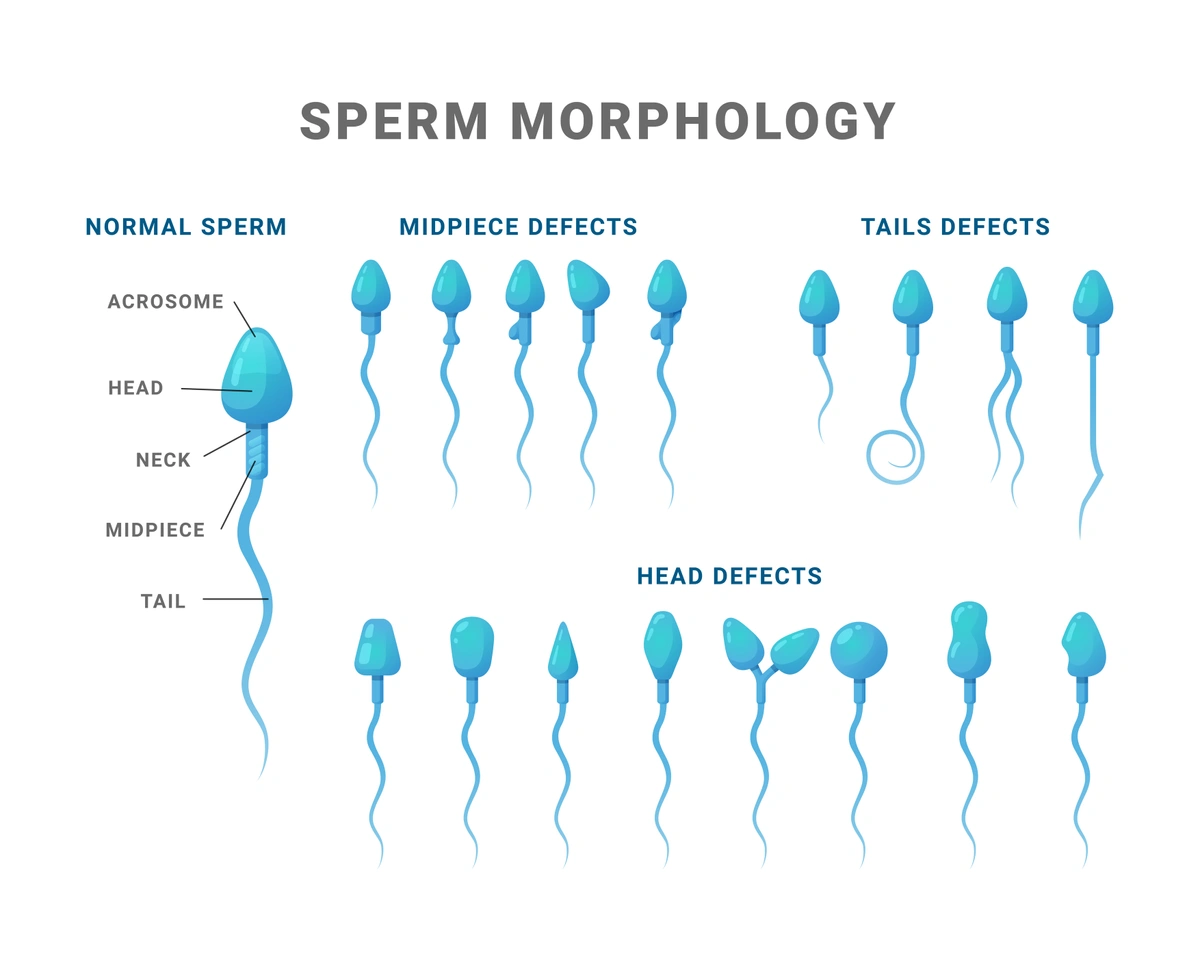
Male Fertility 101: What Every Man Should Know About His Reproductive Health
When it comes to fertility discussions, much of the focus tends to be on women. However, male fertility plays an equally important role in conception. It’s estimated that male factor infertility is the sole contributor in nearly one third of all infertility cases. Understanding male reproductive health is crucial for those looking to start a family.
Understanding Male Fertility
Male fertility is primarily determined by the quality and quantity of sperm. For conception to occur, sperm must be:
-
Healthy in Number (sperm count or concentration): A normal sperm count should be greater than 15 million sperm per milliliter of semen.
-
Motile: Sperm must swim effectively to reach and fertilize the egg. Normal motility should be over 40% forward-moving sperm.
-
Morphology (shape of sperm): Properly shaped sperm have a better chance of successful fertilization.
Illustration of sperm morphology defects
Factors That Influence Male Fertility
Several lifestyle and medical factors can impact a man's fertility, including:
-
Age – While men continue producing sperm throughout their lives, fertility starts to decline around age 40 due to reduced sperm quality. Erectile dysfunction is more common with advancing male age as well.
-
Diet & Nutrition – A diet rich in antioxidants, vitamins (e.g., Vitamin C, Zinc), and healthy fats can improve sperm health.
-
Weight – Being overweight or underweight can lead to hormonal imbalances that affect sperm production.
-
Smoking & Alcohol Consumption – Both have been linked to lower sperm quality and reduced fertility potential.
-
Stress & Mental Health – Chronic stress can negatively impact testosterone levels and sperm production.
-
Environmental Toxins – Exposure to pesticides, herbicides, heavy metals, and endocrine disruptors can harm sperm health.
-
Medical Conditions – Conditions like diabetes, varicocele (swollen veins in the scrotum), and hormonal imbalances can contribute to male infertility.
Illustration of varicocele
Testing Male Fertility
If a couple is struggling to conceive, a semen analysis is often the first step in evaluating male fertility. This test measures sperm count, motility, morphology, and overall semen health. Additional tests, such as hormone testing or genetic screening, may be recommended depending on the results.
How to Improve Male Fertility & When to Seek Help
Men looking to optimize their reproductive health can take proactive steps, including:
-
Maintaining a healthy weight through balanced nutrition and regular exercise
-
Avoiding smoking, excessive alcohol consumption, and drug use
-
Reducing stress through mindfulness, yoga, or therapy
-
Limiting exposure to environmental toxins by choosing organic foods and avoiding plastics with BPA
-
Limiting excess heat to the groin area (e.g., avoiding prolonged hot tub immersion)
-
Consulting a fertility specialist for personalized recommendations if facing difficulty conceiving
If a couple has been trying to conceive for a year (or six months if the woman is over 35) without success, it may be time to consult a fertility specialist. Early diagnosis and intervention can improve the chances of conception and provide a clearer understanding of fertility options.
Conclusion
Male fertility is a key component of conception and overall health. By understanding what influences sperm health and taking proactive measures, men can improve their reproductive potential. If you have concerns about fertility, don’t hesitate to seek medical advice—early action can make all the difference in your journey to parenthood. Schedule a consultation with us today!
Categories
About the AFCC Blog
Welcome to the Advanced Fertility Center of Chicago’s blog! Here, you will find information on the latest advancements in fertility care and treatments, including IVF, IUI, third-party reproduction, LGBTQ+ family building, preimplantation genetic testing, and more. Since 1997, we’ve used our experience and continuous investment in the latest fertility technology to help thousands of patients grow their families. Contact us today for more information or to schedule a new patient appointment.



